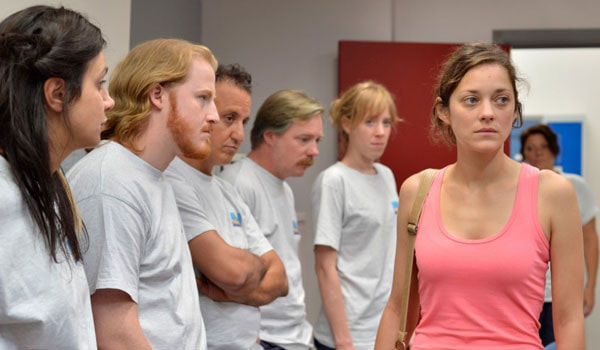Sandra’s problems are compounded when she’s fired from her job in a solar-panel factory in an ostensibly democratic fashion. Her coworkers were presented with a choice between receiving an annual bonus and allowing Sandra, just returned from a lengthy absence, to keep her job. They choose the latter, but the foreman (Dardennes mainstay Olivier Gourmet) poisoned the well by telling everyone that if Sandra stays on, their own jobs would be in danger. The owner allows for a re-vote the following Monday, giving Sandra the weekend to contact her dozen-plus coworkers and argue her case. This would be a tall order for anyone, but in Sandra’s fragile state, she’s particularly ill-equipped to make such entreaties. However, the family needs her income to stay in their current home, leaving Sandra with little option but to pick up the phone and call the first name on her list.
With only a brief introductory prologue and an edge-of-your-seat denouement, Two Days, One Night is primarily these interactions. A cinematic challenge quickly becomes apparent, where the viewer is left to hope that each will be sufficiently distinct. That concern is quickly dismissed, as the viewer’s in the hands of expert filmmakers. The first is a simple phone call. Sandra’s robotic and tentative in her pitch, and she has to take a break to collect herself. Initially wanting to keep her bonus, the woman on the other end changes her mind, all without the viewer ever hearing from her. This one’s easy, but the next is the polar opposite. The coworker meets her with his wife, and sympathetically explains that he voted for his family and not against her. It’s easy to imagine the low-key indie film that could be made about them, as they’re also financially struggling and doing odd jobs to supplement a tenuous lifestyle. The same is true for other coworkers, their own lives resting on the edge of self-sufficiency and the dole. Sandra can only make her case gently, as she doesn’t know what she would do if the shoe was on the other foot. Subsequent visits don’t spare the awkwardness. Some refuse to talk to her, some are receptive, some are tortured at having to make this decision, some are outright hostile. One man breaks down as Sandra approaches, ashamed at himself for voting against her and pledging his future support. Every new scene brings with it the capacity to surprise and affect.
It would be easy to suggest that Sandra’s confidence builds with each interaction, but there’s nothing so simple here. The stress of this situation justifiably weighs on her. The always-brilliant Cotillard plays Sandra as raw and struggling minute to minute, resentful of herself for being so weak and of the company for making her do this. Her depression means a bout of self-hatred, and without Manu propping her up, it’s easily imaginable that she would throw her hands up and submit, plunging further into herself. Where she would call herself unreliable, her husband would say she’s recovering from an illness. Where she would say she can’t work like she used to, he would say she’s in a momentary rut that will inevitably end. Because this film is interested in tough questions, even Manu’s constant support is up for debate as Sandra wonders if he’s switched to pitying her instead of loving her. Two Days, One Night has few answers for its characters.
The one thing the Dardennes know is uncertainty. In conversations, the picture of the company’s economic health is gradually revealed. Though Chinese competition is hurting them, their margins are still positive, if shrinking. In Sandra’s time off, everyone figured out that with a reasonable amount of overtime, the same output could be generated without her. If Sandra stays, not only does the bonus go, but the overtime as well. These details could be tilted in one way or another, but the bare financial facts are revealed to be neither exploitative nor greedy. The premise is cowardly and it’s hard to imagine any kind of workplace cohesion after the results, no matter what they are, but this is a film about the workers and not the management. What’s obviously wrong is the misinformation peddled by the foreman, but the film doesn’t take a position on acting in one’s own self-interest, even when confronted with the consequences of doing so. Part of capitalism is monetizing one’s self-interest and worth, but seeing the end result of one’s self-interest changes the calculus for some, while it makes others lash out. As much as is possible in a narrative film, the Dardennes stay neutral. Despite her difficulties, it’s easy to want Sandra to remain employed and her family to retain its stability. To their great credit, the Dardennes make the viewer question that hope at multiple turns.
Two Days, One Night presents the kind of knotty conundrum found in classic morality puzzles, but it lets the viewer get to know the people standing in front of the oncoming train and those who may or may not switch the tracks. It hits emotional and intellectual heights while also wowing with the depth of the cast and the strength of its bravura lead. This is the Dardennes’ masterpiece, high praise when their resume is studded with other great films. A

 RSS Feed
RSS Feed